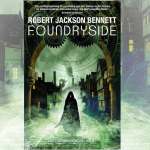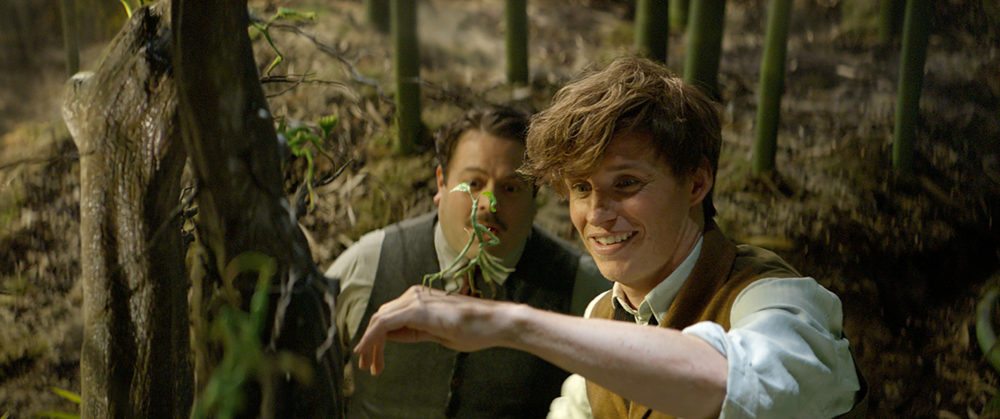
I’ve reviewed Robert Jackson Bennett on GeekDad before, having very much enjoyed his captivating “Cities” trilogy. Jackson Bennett writes novels with great hooks but what makes them so good are the well-rounded and engaging characters. He has a knack for looking at human nature and unpicking it to give an unflinching analysis of how the world works. Like the best SFF writers, though his books are set in far-flung, fantastic locations, they offer a window on contemporary society, making us ask questions about the world in which we live.
Foundryside is no exception. I think it’s his best novel to date. It’s also the best fantasy novel I’ve read in quite some time. It satisfies in just about every way. Here are five reasons why you should read it.
1. The Magic.
Magic, the main staple of a fantasy setting is difficult to get right. It’s also hard to find a new angle. Whilst not without precedent, Foundryside’s idea of physical items being imbued with an essence of magic feels fresh, exciting, and almost infinite in scope. I’m not talking about a +1 Sword or a ring that makes you disappear. In Foundryside, common, mundane objects can be “scrived” (essentially, have runes carved on them) to overcome the laws of physics. Want a cart to move unaided? Convince it that it’s on a hill and it will roll forwards. Want to improve the efficacy of thrown weapons? Make them think they’ve been falling through the sky for several hundred meters, before being thrown. Don’t want a door to open? Get it to feel totally and inseparably in love with the door frame.
The “magic” lies in the reprogramming of an object’s reality. Jackson Bennett then goes on a riotous rampage with this idea. The core device is quite simple, but the author makes it work in a number of different ways, keeping it fresh and exciting. Better still, this magic is not infallible. The rules governing it are strict but open to interpretation. Much of the novel is about the system’s limitations rather than what can be done with it.
2. The Characters.
Robert Jackson Bennett is a very fine character writer. It’s why the Cities trilogy is so good. Foundryside too has a host of great personalities. Central character, Sancia Grado, is a thief with a dark past, which I concede is not an original character idea. As the novel opens she is in the middle of a job, one that could set her free from her demons. We immediately know that Sancia is special. She can feel her surroundings. If somebody is in the room next door she can feel their presence through the floorboards. Why this might be, ties back into the magic system in a thought-provoking fashion.
Pitted against her is the curiously noble Gregor, Captain of the Guard. He will try to pick up the pieces of the Sancia’s late-night foray. Gregor too is a man with secrets. Joining Sancia on her quest, and possibly my favorite character is Clef, a sentient ancient magical artifact. Clef is central both to the story and making the novel an entertaining and engaging read.
Beyond that, the wider characters are fine too. Allies and villains move in and out of the piece, each of them convincing, considering the world in which they live and the circles in which they move. As the novel progresses it becomes not only about the characters unraveling the central mystery but also about the growth of the story’s players. It’s about the difficulty of outrunning your past and how hard it can be to alter your own definition of self. This is expertly done and the depth of empathy Jackson Bennett evokes for his characters is what makes Foundryside so good.

3. The Setting.
The idea of setting as character is something of a cliché, but I think the city of Tevanne is worthy of this accolade. It’s the dichotomy of the city in which the tale is set that underpins the novel’s central tenet. Underneath all the (very exciting) story is the question of how easy it to change yourself and alongside that the perils of compromising one’s principles for expediency.
Tevanne has two distinct types of area. “Campos,” which are walled enclaves controlled by the great (magic) houses and “The Commons,” the bits in between the walls where everybody else lives. These are dirty lawless places, outside of the jurisdiction of the Campos, with nobody wishing to take responsibility for them. As the novel opens, Sancia is a thief operating out of Foundryside, an area of The Commons. Its grimy anarchy is vividly described, as are its people battling against adverse conditions to eke out an existence.
4. The Set Pieces.
If you’re going to fill your novel with reality-bending magical devices you ought to be prepared to use them. Robert Jackson Bennett most certainly is. The book is filled with excellent set pieces, filled with thrills and spills, not to mention unexpected double-crosses. Each one contains scrived device shenanigans with powerful weapons and gravity-defying maneuvers. The set pieces are imbued with tension and excitement and such is the nature of the story and its characters, with the possible exception of Scania, you never know who’s fair game for a life-ending calamity.
5. The Real World Parallels.
The use of SFF as social commentary is hardly a new idea, but with Foundryside Robert Jackson Bennett has demonstrated that he’s up there with the best of them. His societal construct of a two-tier society, where the wealthy barely notice the plight of the poor around them, is not a well-hidden metaphor, but it’s a powerful one.
More interesting, perhaps, is the fragility of Sancia’s mental state. There are obvious parallels with real-world mental health conditions and the book highlights the importance of compassion and understanding when interacting with somebody who is suffering from a mental health disorder.
The book also examines the wider question of whether it’s possible to overcome your past and the difficulties of doing so without help, or if society pigeonholes you. The question of historic systemic behavior is also analyzed. How corporations, governments and large conglomerations of people tend to be very resistant to change. Beyond that, Jackson Bennett demonstrates how lowering one’s standards for the sake of expediency, can lead to disaster. The erosion of standards causes people to gradually accept the unthinkable. How the construction of a new paradigm (say, around the veracity of the press), could result in abuses of power further down the line.
The TL;DR
Whilst Foundryside is a secondary world fantasy it has many things to say about the world in which we live and the way our societies are constructed. It’s a novel with a huge heart that’s filled with empathy. It introduces a host of engaging characters and makes sure you care about them. The magic system is impeccable and the plot exciting. Foundryside is filled with twists, unexpected turns, and some humdinger set-pieces. Much of the plot of this volume is resolved before its end, but there is a massive question left unanswered for book 2. A book that I cannot wait to read!
If you enjoyed this review, check out my other 5 Reasons to Read posts, here.
If you want to pick up a copy of Foundryside you can do so, here in the US and here, in the UK.
Don’t forget…
This review is just one stop on the #Foundryside Blog Tour. Check the others out too!
Disclaimer: I recieved a copy of this book for review.





Thank you for bringing up the real world parallels, I didn’t have space in my review to talk about that as much as I wanted. that scene at the end, where Sancia really has to think about how she describes herself, gave me shivers for like an hour! I really like characters I can relate to, and I felt like I could relate to both Sancia and Berenice. and Orso? he’s just a super fun mad-scientist type guy!